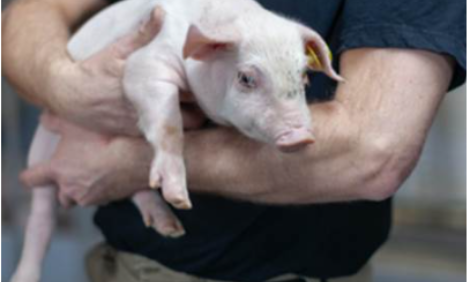



Building Trust through Quality Assurance
Building success in the market, both domestically and internationally, is based on building trust in the quality and safety of products and now more importantly trust in the ethical correctness of production, writes ThePigSite editor in chief, Chris Harris.To achieve this, quality management and quality assurance are going to become and ever growing element of competitiveness in the agriculture and food industry.
And alongside this issues of animal welfare and sustainability are going to gain in importance.
This was the message from Professor Thomas Blaha from the University of Veterinary Medicine at Hanover in Germany and adjunct professor of epidemiology at the College of Veterinary Medicine at the University of Minnesota in the US to the World Pork Conference in Bonn recently.
Professor Blaha said that world pork production is expected to grow by 25 per cent between 2008 and 2020. This compares with beef production, which will grow by 13 per cent, and poultry production by 31 per cent.
At the same time, pork production is expected to undergo further concentration, both in the number of pork-producing countries and also pork-producing regions.
Because of the concentration of production, competitiveness is going to depend increasingly on product and process quality when cost is taken away.
Both consumers and NGOs are becoming more and more critical, he said.
In Germany, the third largest pork producer in the world after China and the US, the industry had developed a competitive pig production base, especially in high density and high competency areas for finishing domestic and imported pigs.
Last year, Germany slaughtered and processed 58.35 million pigs and over the decade from 2000 to 2010, it has increased its self-sufficiency from 87.1 per cent to 110.2 per cent.
This growth in its self-sufficiency has given Germany its competitive base, said Professor Blaha.
The processing industry in the country has also seen a large degree of consolidation and concentration with the introduction of new technology and high hygiene standards.
The industry has also developed veterinary agreements with major importing countries to ensure a strong market for the country's pork.
All this has been built on the implementation and continuous refinement of an umbrella quality assurance scheme right along the food chain from primary production through to retail.
"The production base is rapidly changing from small scale producers to large scale producers," said Professor Blaha.
"Producer networks are overtaking the traditionally fragmented industry and there is a concentration of production in regions with a well-established network of feed mills."
He added that the industry was gaining a growing understanding of health needs for both domestically produced and imported pigs right up to finishing.
At the same time, the meat industry is also changing with new enterprises springing up over the last decade.
Now the concentration of the industry has meant that more than 73 per cent of Germany's total pig meat production is in the hands of just 10 companies.
"The extension of the production capacities of these companies was always coupled with major investments in technology and hygiene, as well as into enhancing animal handling and humane stunning," said Professor Blaha.
"This has helped to enhance the sector through food safety and animal health."
He added that the country has a 110-year history of stringent meat inspection to ensure food safety and over the years, the animal health measures that have been taken have seen the eradication of classical swine fever (CSF) and pseudorabies (Aujeszky's disease).
These measures along the food chain have been the basis for the country's quality assurance scheme the QS System, which was founded in 2001 and is a partnership between the feed industry, farmers association, meat industry, meat processing industry and the retail sector.
The system, which was voluntary to begin with, started with the pork chain to ensure compliance with all the legal standards at all stages of the chain. It also added one level above the legal standards – Salmonella monitoring.
Professor Blaha said that the QS system was based on three principles:
- say what you do
- do what you say, and
- prove that you do what you say.
The ethos behind the QS system is risk management rather than crisis repair.
"It is not driven by the customer," said Professor Blaha.
"The retailer has to be audited and accept the standards as a whole.
"It is neutrally audited and built as a flexible system to allow other issues to be added."
He said the difference between the QS system and others is that not only is it neutrally audited but that it also includes the retailer.
At present, the system in Germany includes all the feed mill operators, 95 per cent of the farmers – more than 46,000 in total – all the slaughter and cutting plants, one-third of the processing plants and 80 per cent of the retailers.
The inclusion of Salmonella monitoring in the system allows the industry to reduce the possibilities of contamination at slaughter and also to reduce levels on farm.
Professor Blaha also said that the audits that are carried out under the system are also increasingly recognised by veterinary authorities around the world.
He said: "The German QS system as a chain-spanning quality assurance system has contributed to the growth of German pork production including its growing export activities.
"Quality assurance systems will become an ever growing element of production.
"You have to build trust into production and they will help to build that trust," Professor Blaha concluded.
December 2011








